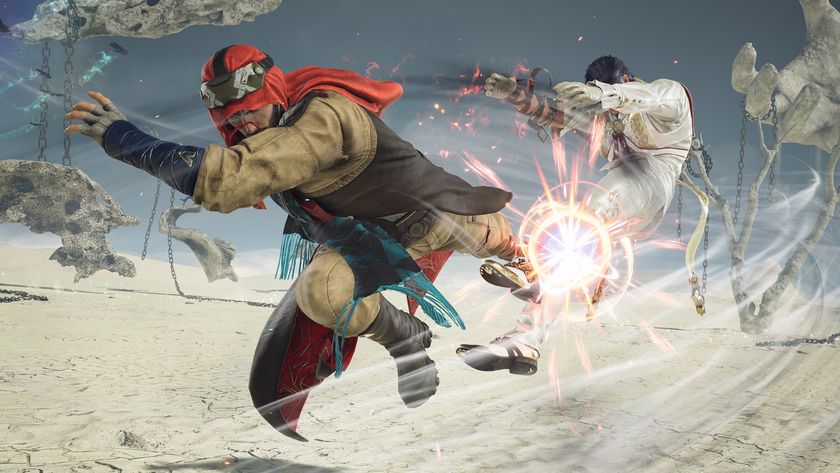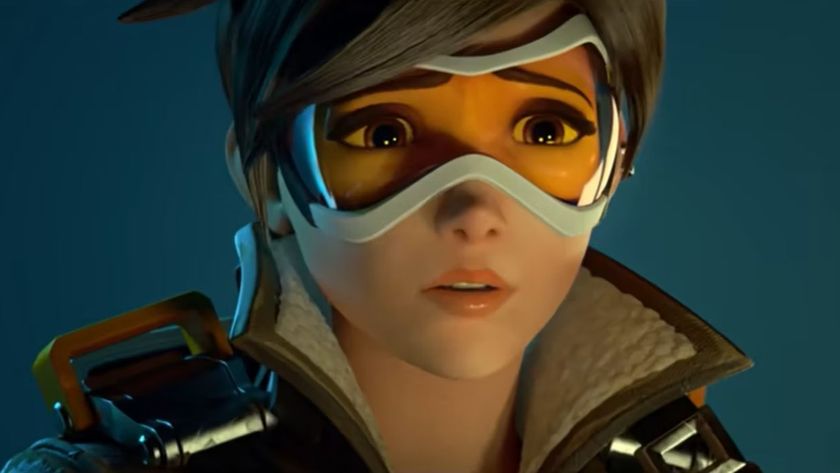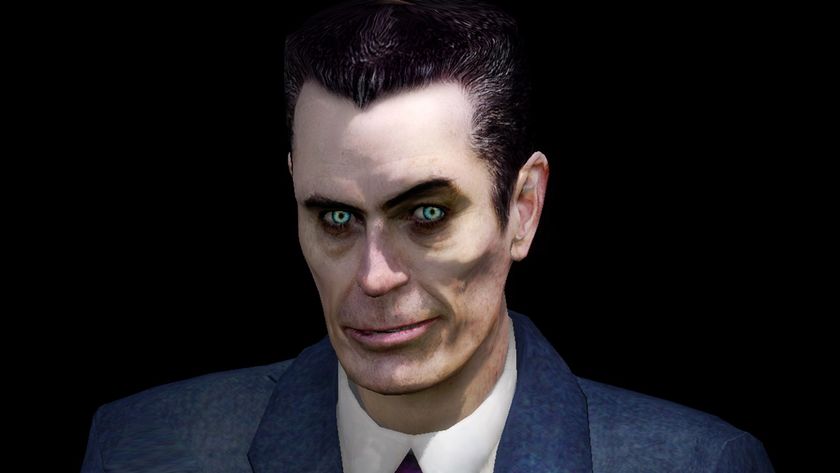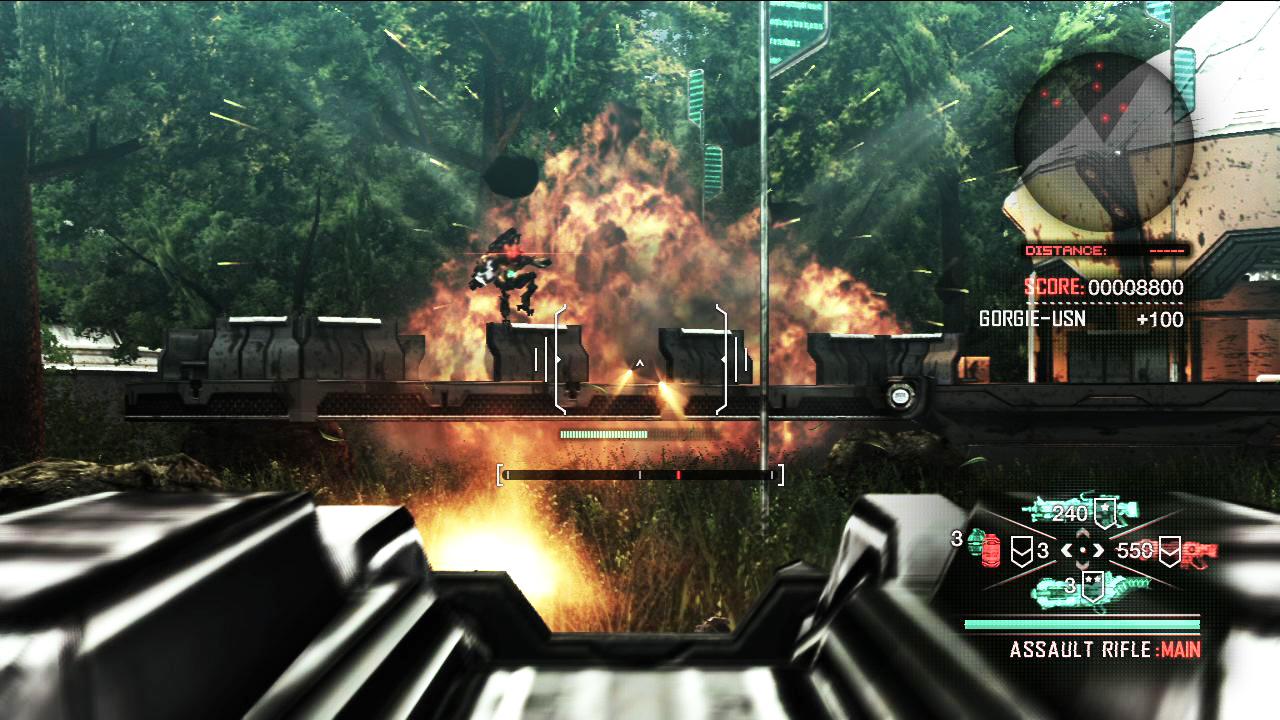Why you can trust GamesRadar+
In the first few levels alone, for example, you’ll be slammed against an Omaha Beach-style wall of machinegun defenses, during which you can hijack the enemy’s robot walkers and machinegun turrets as enormous spaceships crash all around you. Then you’ll get to take down an impossibly huge walking tank with glowing weak-point joints that, when “defeated,” transforms into an even tougher humanoid form, and eventually squeezes you into a couple of simple but ultra-slick quicktime sequences before it goes down.

Above: It also does this when its first stage “dies.” What a crybaby!
After that, you’ll face off against an alarmingly fast tank tricked out with giant sawblades, and then you’ll need to slowly lead a floodlight-bearing APC to safety through a dark tunnel filled with giant, tentacled bomb-things. Then you’ll be sent hurtling down a superfast monorail track against the backdrop of a richly detailed cityscape, where you’ll be forced to rapidly clear another train of enemies before it can crash into your own.

Again: those are just the opening levels. Vanquish’s biggest strength is that it’s able to almost constantly come up with something new and cool to see, do or shoot at, making for an experience that always manages to feel fresh and engaging despite its relentless pace. In between all these thundering events, you’ll spend most of your time chewing your way through hordes of rank-and-file robot grunts – but even these fights are so well-designed and varied that they never feel like a slog. Even when the newness finally wears off and the game calms down to a more steady pace, it still manages to dig out a few surprising ways to throw you for a loop before booting you into a fantastically bloody, all-bets-are-off finale.
The downside, of course, is that no game can sustain this kind of pace for long. Vanquish can be slammed through in about six to eight hours, although nearly every second of that feels like a rollercoaster ride, and I never felt cheated by the length. There’s also some replay value here, much of it in going back through the surprisingly fun-to-replay story to find and destroy all the hidden Pangloss statues (one of several odd references the game makes to the classic satirical novel Candide), or just to improve your score, assuming you actually care about that.

Also, crashing your way through the story will earn you access to the game’s Challenge levels, a handful of Horde mode-like stages that pit you against overwhelming odds and challenge you to hold out for as long as possible. It’s not as much fun as an actual multiplayer Horde mode would be, but it’s still enjoyable if you’re in the mood for throwing yourself against enormous waves of baddies until you die.
Shortcomings aside, Vanquish is a brilliant, wildly enjoyable shooter that isn’t quite like anything else on the market right now. We won’t go so far as to assert that it’ll do for shooters what, say, Devil May Cry did for action games – but all the same, we’d be pretty happy if it did.

Quantum Theory? Yes. God yes. Quantum Theory and Vanquish are only really similar in that they’re both Gears of War-style shooters created by Japanese developers for an American audience, but they’re linked in that A) they arrived within a month of each other, and B) Vanquish is basically the opposite of Quantum Theory. Everything QT does wrong, Vanquish does right, from the pacing and characters to the level design and action. True, we can’t throw a vapid sword-girl at a giant, pointy-elbowed sack of glistening poop in Vanquish, but we think we can live with that.

Gears of War 2? No, but only because Gears 2 has one important thing that Vanquish doesn’t: multiplayer. And while we respect that Vanquish was never meant to be a multiplayer game, it’s still a feature that’s given Gears 2 a long shelf life, and made it an overall fuller experience. Also, Vanquish’s unlockable Challenge levels – which pretty clearly have a lot in common with Gears’ Horde mode – would have been a hell of a lot more enjoyable to tackle with a few friends.

Bayonetta? Yes, but only just. It might seem weird to compare two games that play completely differently from each other – one’s a cover-based shooter, the other’s a Devil May Cry-style slash ‘em-up – or to say that the one that scored a 10 in January is somehow inferior. But Platinum Games’ last effort, despite being awesome, still managed to leave a bad taste in some mouths thanks to an unforgiving, relentless level of difficulty that let players scrape by with mediocre performances, but mocked them for it afterward. Vanquish can be tough, but it wants you to succeed, and to feel great about succeeding. So while it retains much of Bayonetta’s darkly smirking sense of fun, it never makes fun of you if you suck.
Insanely fast and relentlessly fun, Vanquish manages to keep up a breakneck pace almost throughout its entire runtime, never quite slowing down enough to get boring. Of all the Gears of War-alikes we’ve played, this may be the best.
Oct 19, 2010
More info
| Genre | Shooter |
| Description | Insanely fast and relentlessly fun, Vanquish manages to keep up a breakneck pace almost throughout its entire runtime, never quite slowing down enough to get boring. Of all the Gears of War-alikes we’ve played, this may be the best. |
| Platform | "PS3","Xbox 360" |
| US censor rating | "Mature","Mature" |
| UK censor rating | "18+","18+" |
| Release date | 1 January 1970 (US), 1 January 1970 (UK) |

After preserving the AI ghost of a fan's late brother, Tekken 8 boss says it might be a glimpse of the future where you don't "need an opponent who is human that has the exact same skill level"

After struggling to make sequel-sized changes, fans think Blizzard might retire the '2' in Overwatch's name based on Season 16 leaks

Valve leads considered making a "mediocre" game before Half-Life to build the team up, but original marketing exec said "if you do that, the company will fail"











